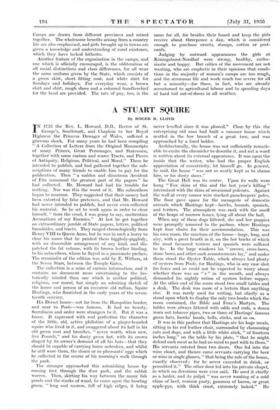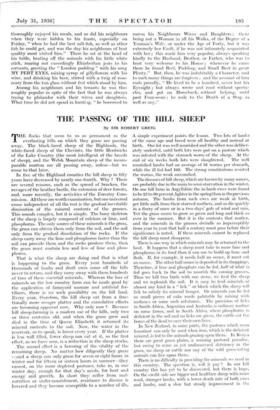A STUART SQUIRE
By ROGER B. LLOYD
IN 1753 the Rev. L. Howard, D.D., Rector of St. George's, Southwark, and Chaplain to her Royal Highness the Princess Dowager of Wales, suffered a grievous shock. For many years he had been compiling " A Collection of Letters from the Original Manuscripts of many Princes, Great Personages, and Statesmen, together with some curious and scarce Tracts, and Pieces of Antiquity, Religious, Political, and Moral." These he intended to publish, and had gathered together the sub- scriptions of many friends to enable him to pay for the publication. Then " a sudden and disastrous Accident of Fire consumed the greatest part of the papers " he had collected. Mr. Howard had had his trouble for nothing. Nor was this the worst of it. His subscribers began to murmur. They suggested that their money had been extorted by false pretences, and that Mr. Howard had never intended to publish, had never even collected his material. So he set to work again in order to clear himself, " from the cruel, I was going to say, unchristian Accusations of my Enemies." At last he got together an extraordinary jumble of State papers, letters, political broadsides, and tracts. They ranged chronologically from Henry VIII to Queen Anne, but he was in such a hurry to clear his name that he printed them higgledy-piggledy, with no discernible arrangement of any kind, and dis- patched the fat volume, with its brown leather binding, to his subscribers, whom he flayed in a passionate preface. The remainder of the edition was sold by E. Withers, at the Seven Stars, between the Temple- Gates.
The collection is a mine of curious information, and it contains no document more entertaining to the his- torically minded than one which is neither political, religious, nor moral, but simply an admiring sketch of the house and person of an eccentric old ruffian, Squire Hastings, who flourished in the early years of the seven: teen th century.
Ills Dorset house—not far from the Hampshire border, and near to Poole—was famous. It had no beauty. Seemliness and order were strangers to it. But it was a home. It expressed with real perfection the character of the little, old, active philistine of a ginger-bearded squire who lived in it, and swaggered about its hall in his old green coat and breeches, " never worth, when new, five Pounds," and his dusty green hat, with its crown dinged by its owner's demand of all his hats—that they should be capable of carrying home unbroken, and whilst he still wore them, the dozen or so pheasants' eggs which he collected in the course of his morning's walk through the park.
The stranger approached this astonishing house by coming first through the deer park, and the rabbit warren. Then, skirting his way between the many fish ponds and the stacks of wood, he came upon the bowling green. " long and narrow, full of high ridges, it "being never levelled since it was plowed." Close by this the enterprising old man had built a summer house which nestled in the low branch of a great tree, and was approached by a fixed ladder.
Architecturally, the house was not sufficiently remark- able to excite the chronicler to describe it, and not a word is written about its external appearance. It was upon the inside that the writer, who had the proper English appreciation of eccentricity, let himself go. general, he said, the house " was not so neatly kept as to shame him, or his dusty shoes."
The Great Hall was its centre. Upon its walls were hung " Fox skins of this and the last year's killing " intermixed with the skins of occasional polecats. Against the wall at every corner were stacked gamekeepers' poles. The floor gave space for the menagerie of domestic animals which Hastings kept—hawks, hounds, spaniels, and terriers. The atmosphere was rank with the smell of the heaps Of marrow bones, lying all about the hall.
When any of these dogs littered, she and her puppies were promptly removed to the parlour, where Hastings kept four chairs for their accommodation. This was his own room, the sanctum of the house—large, long, and airy, with a great hearth in it, on the hot bricks of which the most favoured terriers and spaniels were suffered to lie. In the large windows his " arrows, cross-bows, stone bows, and other such accoutrements lay," and under them stood the Oyster Table, which always had plenty of oysters from Poole, for Hastings, who in any case shot his foxes and so could not be expected to worry about whether there was an " r " in the month, and always demanded his nightly ration of oysters before supper. At the other end of the room stood two small tables and a desk. The desk was more of a lectern than anything else. It was rarely used for writing, but chiefly as a stand upon which to display the only two books which the room contained, the Bible and Foxe's Martyrs. The tables were always littered with odds and ends, a dozen worn out tobacco pipes, two or three of Hastings' famous green hats, hawks' hoods, bells, sticks, and so on.
It was in this parlour that Hastings ate his huge meals, sitting in his red leather chair, surrounded by clamouring cats and dogs, and with a little white stick, " of fourteen inches long," on the table by his plate, " that he might defend such meat as he had no mind to part with to them." His servants entered from two doors. One led into the wine closet, and thence came servants carrying the beer or wine in single glasses, " that being the rule of the house, exactly observed ; for he never exceeded in drink, or permitted it." The other door led into his private chapel, in which no devotions were ever said. He used it chiefly as a larder, and its, pulpit " was never wanting of a 'cold chine of venison pasty, gammon of bacon, or great apple-pye,- with thick crust; extremely baked." He thoroughly enjoyed his meals, and so did his neighbours when they were bidden to his feasts, especially on -Friday, " when he had the best. salt-fish, as well as other fish he could get, and was the day his neighbours of best quality most visited him." There he sat at the head of his table, beating off the animals with his little white stick, roaring out exceedingly Elizabethan jests to his servants, greeting the " London pudding 7 with his song MY PERT EYES, mixing syrup of gillyflowers with his wine, and drinking his beer, stirred with a twig of rose- mary from the tun glass without feet which stood by him.
Among his neighbours and his tenants he was tho- roughly popular in spite of the fact that he was always trying to philander with their wives and daughters. What time he did not spend in hunting, " he borrowed to caress his Neighbours Wives and Daughters ; there being not a Woman in all his Walks, of the Degree of a Yeoman's Wife, or under the Age of Forty, but it was extremely her Fault, if he was not intimately acquainted with her ; this made him very popular, always speaking kindly to the Husband, Brother, or Father, who was to boot very welcome to his House ; whenever he came there he found Beef, Pudding, and Small Beer in great Plenty." But, then, he was indubitably a Character, and to such many things are forgiven ; and the account of him ends proudly, " He lived to be a hundred, never lost his Eyesight ; but always wrote and read without specta- cles, and got on Horseback, without helping, until past Four-score ; he rode to the Death of a Stag, as well as ally."







































 Previous page
Previous page